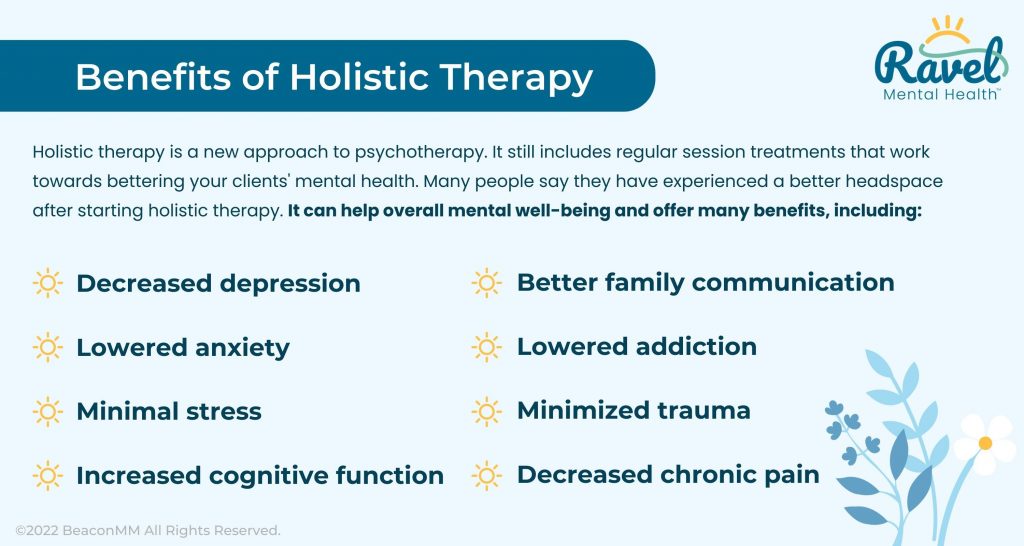Holistic therapy is a new approach to psychotherapy. It still includes regular session treatments that work towards bettering your clients’ mental health.
However, this approach to treatment is a way to treat the mind and body. Therapists who practice this type of therapy understand how mental health conditions can affect the body and may lead to worsened mental health issues.
But why should you incorporate this mind-body connection approach into your practice? Does holistic therapy work? Here’s a guide on what holistic therapy is, its benefits, and how you could integrate it into your practice.
Are you interested in connecting with new clients? Sign up for Ravel Mental Health today!
What Is Holistic Therapy?
Holistic therapy is an approach to therapy that works towards treating the mind and the body. Therapists who take this approach recognize the connection between a person’s mind and body and how the state of their mental health could affect their overall well-being.
Many people have noticed the effects that stress can have on their body from tight muscles, headaches, or even acne. Treatment types that incorporate the mind and body can help some people have a better therapy experience and be treated effectively.
Holistic therapy doesn’t ignore psychotherapy practices but rather incorporates new treatment plans that include the body. Some patients can have physical symptoms that arise from their traumatic experiences, and using a holistic approach to their care can help treat the mental and bodily symptoms.
This approach also uses a person’s lifestyle as a possible contributing factor to their mental health. This can include if they have a physical exercise regimen that helps them destress or if a person is taking the time to ground themselves. A client’s lifestyle can contribute to their mental health, and adding holistic therapy treatments to their daily life can mitigate one’s mental health condition over time.
Why Should You Implement Holistic Therapy Into Your Practice?
Implementing holistic therapy into your practice can largely benefit you and your clients. It doesn’t mean that you’re outcasting your psychotherapy treatments completely but instead using holistic therapy as a tool to effectively treat more patients.
Some benefits of incorporating holistic therapy into your care plan include attracting more clients. Since there aren’t as many holistic therapists, those searching for that treatment will be more drawn to your services. It also shows the adaptability of your care to each treatment, which can make people feel more comfortable choosing you as their therapist.
For clients, finding a holistic therapist can be largely beneficial for effectively treating their mental health conditions. They’ll be able to get a treatment that is unique to what they’re going through and have techniques that can help them in and out of the therapy sessions. Some may find that regular psychotherapy isn’t the right fit for them and want to use a holistic approach to their care as it can help them feel less stressed and improve their daily life.
Adding holistic therapy to your services allows you to reach more people in need and gives clients another treatment option that may work better than psychotherapy by itself.
What Are the Benefits of Holistic Therapy?
Holistic therapy has substantial evidence for helping people with various mental health conditions. Many people say they have experienced a better headspace after starting holistic therapy. It can help overall mental well-being and offer many benefits, including:
- Decreased depression
- Lowered anxiety
- Minimal stress
- Increased cognitive function
- Better family communication
- Lowered addiction
- Minimized trauma
- Decreased chronic pain
A 2017 study of 63 participants indicate that somatic breathing might be effective for people with PTSD. This can be good for people who experience physical symptoms from their traumatic experiences. A holistic approach can bring mindfulness and potentially help mitigate the reaction to triggers.
A 2019 randomized control trial in India studied 230 adolescent females that underwent a 1-month holistic-based stress management program. The results suggested that those individuals became less stressed, anxious, and depressed than the control group. This therapeutic approach can even be used on younger people who need mental health therapy.
Are you interested in growing your practice? Sign up for Ravel Mental Health today!
What Are Techniques of Holistic Therapy?
Holistic therapy seeks to enhance the mind-body-spirit connection to improve a person’s well-being, lower their stress, and reduce their trauma responses. Treatment techniques used for holistic therapy are typically complementary therapies that help reinforce psychotherapy done in sessions and work as an additional exercise at home. Holistic therapy treatment techniques could include:
- Breathwork
- Meditation
- Stress management
- General therapy
- Somatic experiencing
- Hypnosis
- Cognitive behavioral therapy
- Yoga
- Acupuncture
- Massage
- Tai chi
- Grounding
- Cranial sacral therapy
- Reiki
- Sound baths
These techniques work to bring together a person’s mind and body. Doing exercises such as breathwork or meditation can make someone aware of the state of their body and mind. It can work as a grounding exercise that helps some people feel recentered.
Meditation, breathwork, and yoga are common treatment exercises used by holistic therapists. Some therapists even recommend getting acupuncture or massage treatments to their clients as it can help decrease stress or anxiety. Exercises such as tai chi, grounding, or cranial sacral therapy can also enhance awareness of that person’s surroundings and themselves.
You can integrate these techniques into your practice by making exercise treatment options for your clients. Explaining what they are, why they can help them, and how to do it can help them practice these exercises outside of your sessions. Running through the exercise with them can help ease anxieties about trying it and allow them to ask questions about it.
Who Can Benefit From Holistic Therapy?
Many people can benefit from holistic therapy. Since it works to bring awareness to how one’s mental health status affects their body, it can help motivate some people to make the necessary changes to improve their lives and effectively treat the mental health condition they’re experiencing.
People that can benefit greatly from holistic therapy can include individuals with:
- Anxiety
- Depression
- Stress
- Trauma
It is important to note that people that have recently gone through a traumatic experience such as sexual assault should wait before practicing some holistic treatments. Some exercises, such as meditation, can bring on a high level of anxiety and trigger a trauma response. As a therapist, it’s essential that you proceed with caution on some holistic treatments regarding your client’s situation and use your professional judgment.
Some clients’ mental health conditions may manifest physically in instances such as:
- Phantom pains
- Appetite and digestive issues
- Poor sleep
Working through holistic therapy can help people mitigate or effectively treat someone’s physical symptoms. The connection between the mind and body is powerful and should be treated together to improve the lives of your clients.
How Can Ravel Mental Health Help You?
Ravel Mental Health is an online platform that works to mitigate bad patient and therapist connections. They want to help bring the right clients to your doorstep and give people the type of treatment that they’re looking for.
You can enter your specialty and available schedules. This allows potential clients to see if you’re a therapist that matches their needs and easily schedule an appointment with you. Then within one easy click, you can accept their appointment request and skip the time-consuming phone tag.
If you’re practicing holistic therapy, you can enter that into your profile and match with clients looking for this type of treatment. Ravel Mental Health can help you expand your practice and connect with the right types of clients.
Are you ready to match with new clients? Sign up for Ravel Mental Health today!

